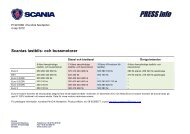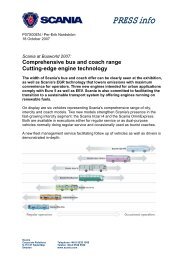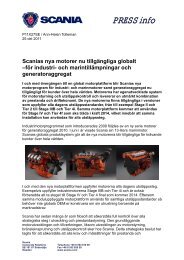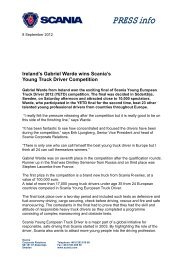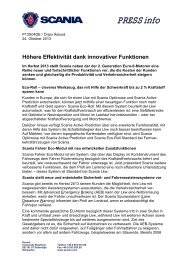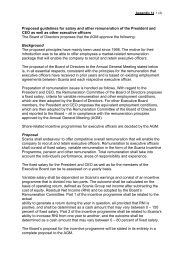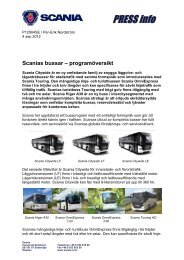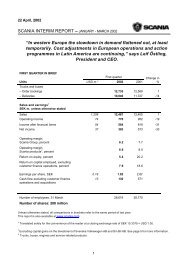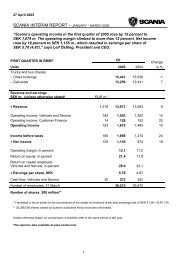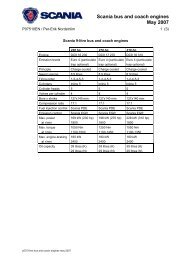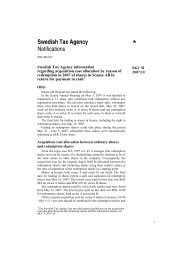Scania Annual Report 2011
Scania Annual Report 2011
Scania Annual Report 2011
Create successful ePaper yourself
Turn your PDF publications into a flip-book with our unique Google optimized e-Paper software.
production<br />
37<br />
High standards of<br />
flexibility<br />
Short, stable delivery times mean that customers<br />
can swiftly put products into operation. This imposes<br />
high standards of flexibility at <strong>Scania</strong>. High quality<br />
is crucial for product functionality and performance.<br />
Quality is also the key to productivity at <strong>Scania</strong>,<br />
enabling it to apply sustainable production methods.<br />
Because of its common product and production system,<br />
<strong>Scania</strong>’s production network is globally integrated. The same<br />
working methods and quality standards mean that production<br />
can be allocated flexibly between Europe and Latin America to<br />
achieve optimal capacity utilisation.<br />
Through the <strong>Scania</strong> Production System (SPS), <strong>Scania</strong> works<br />
with continuous improvements to boost efficiency and flexibility,<br />
and to eliminate environmental waste as well as waste of time<br />
and materials.<br />
A new globally coordinated organisation for safety, health,<br />
working environment and environmental activities was established<br />
late in 2010. The goal is to ensure that <strong>Scania</strong> operates<br />
as a sustainable organisation. These efforts are integrated into<br />
day-to-day operations and include continually working to ensure<br />
safer workplaces and improve well-being in the company, while<br />
minimising <strong>Scania</strong>’s environmental impact.<br />
Flexible production with a high level of service<br />
Since 2010 <strong>Scania</strong> has worked with short, stable delivery times<br />
of six to eight weeks from customer order to truck delivery in<br />
Europe. This enables customers to quickly start using the company’s<br />
products. Starting in autumn <strong>2011</strong>, the same system has<br />
been applied to bus and coach production in Europe.<br />
Applying short, stable delivery times requires a high degree<br />
of flexibility at <strong>Scania</strong>, since the production network must<br />
quickly adapt to actual demand as order bookings change. One<br />
advantage of this working method is that <strong>Scania</strong> avoids building<br />
up sizeable order books, thereby minimising the risk of large<br />
inventories of unsold vehicles.<br />
Demand for vehicles fluctuates with market conditions. This<br />
has been apparent in recent years. A very severe downturn in<br />
2009 was followed by a rapid upturn in 2010 and <strong>2011</strong>. After<br />
production remained at a high, stable level during most of <strong>2011</strong>,<br />
a slowdown in demand occurred in various markets late in the<br />
year. This prompted <strong>Scania</strong> to reduce its vehicle production rate<br />
in two steps. In November <strong>2011</strong>, <strong>Scania</strong> lowered daily production<br />
on a global basis by about 15 percent compared to the end<br />
of the third quarter. Starting in January 2012, the daily production<br />
rate was lowered by another 15 percent. As part of this<br />
adjustment, nearly 1,900 employees are affected by not having<br />
their fixed term temporary contracts renewed.<br />
<strong>Report</strong> of the directors <strong>Scania</strong> <strong>2011</strong>



